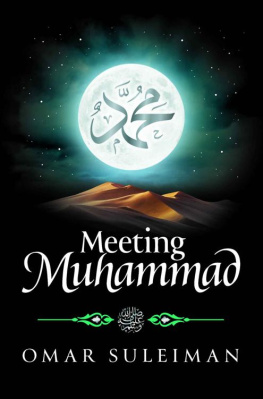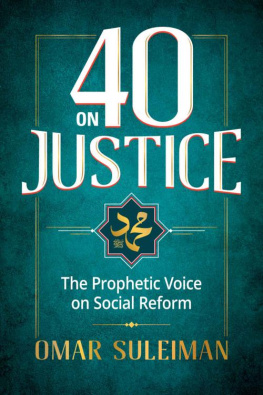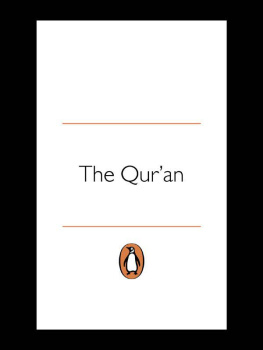Allah Loves...
First published in England by
Kube Publishing Ltd
Markfield Conference Centre
Ratby Lane, Markfield
Leicestershire, LE67 9SY
United Kingdom
Tel: +44 (0) 1530 249230
Website: www.kubepublishing.com
Email:
Omar Suleiman 2020
All Rights Reserved. 1st impression, 2020.
The right of Omar Suleiman to be identified as the author of this work has been asserted by him in accordance with the Copyright, Design and Patent Act 1988.
The author has directed that 100% of the royalties from the sale of this book be donated to Yaqeen Institute, which is a non-profit research institute, supporting their research and activities for the global Muslim community.
Cataloguing-in-Publication Data is available from the
British Library.
ISBN 978-1-84774-135-6 Casebound
ISBN 978-1-84774-136-3 Ebook
Cover design, illustration and typesetting: Jannah Haque
Printed by: IMAK Ofset, Turkey.
 Transliteration Guide
Transliteration Guide 

A brief guide to some of the letters and symbols used in the Arabic transliteration in this book.
 May the peace and blessings of Allah be upon him.
May the peace and blessings of Allah be upon him.
 Contents
Contents 

Allah Loves...
 Introduction
Introduction 

T he Prophet Muhammad ( peace be upon him ) said that one of the supplications of Prophet Dwd ( peace be upon him ) was that he would say, , O Allah I ask You for Your love, , and the love of those who love You, , and all of the actions that would bring me closer to being loved by You.
Our aim should constantly be to pursue Allahs pleasure; pursue the reward that He has promised. Furthermore, one should avoid the things that He has told us to stay away from, but to know that one is loved by Allah, that is the pinnacle. To strive and remain constantly focussed on that goal to pursue Allahs love and to meet Him in that state of love is the most special and sacred level that a human being can attain. In thirty short chapters this book will look at who, and what qualities and characteristics Allah loves and how we may become people who are loved by Allah and do things that Allah loves.
Allah Loves
 Piety
Piety 

T he most frequent references in the Quran to the love of Allah come in relation to taqw , piety. Surah al-Baqarah starts with this beautiful yah :
.
Alif. Lam. Mim. This is a Book in which there is no doubt, it is a guidance for people of taqw .
People of taqw , people of piety, are the ones Allah loves. He says in the Quran: , And Allah loves the people of piety.
The very first command that Allah gives to humanity in the Quran is:
O humanity, worship your Lord who created you and created those who came before you so that you may have taqw, so that you may be conscious of Him.
Specifically, with regards to fasting, Allah declares to us that:
Fasting was prescribed upon you the way it was prescribed to those before you so that you may attain taqw, so that you may attain piety.
One may ask how is this connected to Allahs love?
The starting point is how we understand Divine in the first place. Allah created us not to hate us, but to love us. Allah created us not to fail, but to succeed. Allah created us not to burn in Hell but to go to Heaven. He gave us everything that we needed to attain His reward. He has given us all the essentials needed to attain His pleasure but do we clearly understand and comprehend the fact that we are on this path back to Him, that we dont want to do anything that will compromise His love for us?
There is an ongoing debate about what the true meaning of taqw is: does it mean to be in fear of Him, or to be conscious of Him? What does piety even mean? What does it mean to be God-conscious? How can I fear Him if I need to love Him? If you translate for example as God loves those who fear Him, then this would need further explanation. Ibn al-Qayyim said that when you fear something, you run away from it, but when you fear Allah, you run back to Him. And so the fear of Allah is not the kind that would cause you to flee from Him but to come back to Him because that fear is not like the fear of anything else. Taqw is inadequately understood when defined only in a context of fear.
So how do we merge fear and love? We fear losing His love and that is actually why Ramadan is such an effective way for us to learn how to not lose His love. In Ramadan, we observe carefully how and what we consume. We physically make sure that we dont consume anything that is going to nullify our fast. Likewise, in our daily lives we make sure that we dont consume anything that would spiritually nullify Allahs love for us. We pay closer attention to ourselves. The narration that really encapsulates this is that from Umar ( may Allah be pleased with him ) who said that, Taqw is like a person whos walking on a path again and again, and on this path back to Allah there are thorny bushes on the way, when they witness these thorny bushes close to them, they pull themselves in tighter to make sure that the thorns dont tear their clothes or prick them. And Umars grandson, Umar ibn Abd al-Azz, said that Taqw isnt praying long into the night, it isnt fasting long into the day; it is that you abandon everything that is displeasing to Allah. Everything beyond that is isn , is excellence.















 Transliteration Guide
Transliteration Guide 




 May the peace and blessings of Allah be upon him.
May the peace and blessings of Allah be upon him.